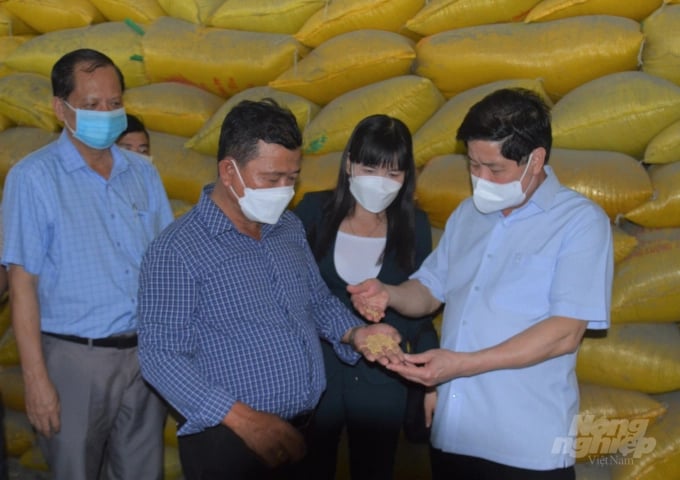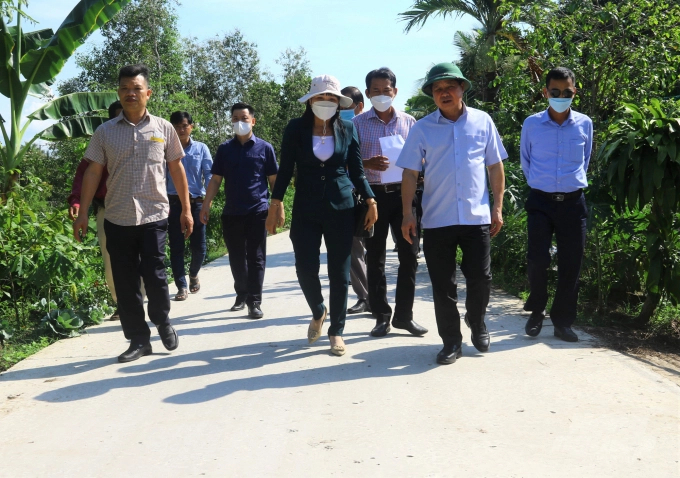November 28, 2025 | 03:44 GMT +7
November 28, 2025 | 03:44 GMT +7
Hotline: 0913.378.918
November 28, 2025 | 03:44 GMT +7
Hotline: 0913.378.918
On April 26, Deputy Minister of MARD Le Quoc Doanh inspected the implementation of Project VnSAT in Hau Giang and Soc Trang provinces.
Deputy Minister Le Quoc Doanh requested localities, especially farmer organizations/cooperatives working as beneficiaries, to bring into full play the functions and efficiency of the infrastructure and equipment that have been converted by the Sustainable Agriculture Transformation Project (Project VnSAT) investment. These are programs with great investment value, assisting the improvement in the capacity of cooperatives, expanding services to benefit members, and increasing profits and revenues for participating members.

Deputy Minister Le Quoc Doanh (on the right) checked the stored rice waiting for the price at the warehouse invested by Project VnSAT at the Phuoc Loc Agricultural Cooperative. Photo: Trung Chanh.
In Hau Giang province, Deputy Minister Le Quoc Doanh visited Phuoc Loc Agricultural Cooperative (Truong Long A commune, Chau Thanh A district). Participating in Project VnSAT, the cooperative received many training courses for its members on rice production process according to advanced techniques of "3 decreases, 3 increases" and "1 must, 5 decreases". Consequently, it has improved the level of rice cultivation, helping to lower costs, improve rice quality and increase economic efficiency.
Additionally, the cooperative is also supported by Project VnSAT with 4 rice drying ovens with a total drying capacity of 100 tons of rice/day, a warehouse with a capacity of 1,900 tons of processed rice and many mechanical equipment and machines to serve in manufacturing. The total investment capital of the Project here is VND7.9 billion, of which the reciprocal capital of the cooperative is VND1.5 billion. Currently, Phuoc Loc Agricultural Cooperative provides services for members such as: producing and supplying rice seeds, agricultural materials, drying kilns and warehouses, and offtake guarantee of commodity rice. Currently, the cooperative has expanded its farming area to 550 ha, with 277 members participating.

Deputy Minister Le Quoc Doanh (on the right) and the delegation inspected the route invested by Project VnSAT in Truong Long A commune, Chau Thanh A district, Hau Giang. Photo: Trung Chanh.
Through Project VnSAT, Hau Giang province has invested in upgrading the infrastructure of rice production areas for 13 agricultural cooperatives in the province, with a total value of over VND90.1 billion. In which, the reciprocal capital from the provincial budget is nearly VND14 billion, private capital is VND2.8 billion, the rest is IDA loan from the World Bank (WB). Additionally, during the Project extension period from 2021 to June 2022, Hau Giang province also invests in public infrastructure with 10 sub-projects, including: 8 pumping stations, 6 open sluices, more than 41km of roads, 12 traffic bridges and a box culvert.
Also on April 26, Deputy Minister Le Quoc Doanh inspected the implementation progress of the Project VnSAT in Soc Trang province and examined the actual investment in infrastructure and equipment invested in organizations. farmers in Chau Thanh district.
Translated by Hoang Duy

(VAN) According to Mr. Vo Minh Thanh, Director of the Tay Ninh Department of Agriculture and Environment, Resolution 57 has created a new development pathway for the locality, shifting from traditional toward modern agriculture.
/2025/11/26/4909-2-154329_878.jpg)
(VAN) Pearl grouper farming in HDPE cages not only delivers economic efficiency but also contributes to protecting the environment, creating jobs, and promoting marine-based experiential tourism.

(VAN) The model of making a living under the forest canopy through the agroforestry system in Van Son commune, Bac Ninh province, is expected to generate an annual income of approximately VND 30 million/ha.

(VAN) Many enterprises in Can Tho are harnessing natural energy and reducing greenhouse gas emissions in their production processes, thereby contributing to the promotion of a sustainable green transition.
/2025/11/24/3536-2-112800_176.jpg)
(VAN) Dong Nai now has tens of thousands of hectares of forests certified for sustainable management, and this area will continue to be expanded in the coming period.

(VAN) Vinh Ha hamlet (Dai Xuyen commune, Hanoi) is shifting away from small-scale farming as households adopt bioscurity into their breeder chicken models.

(VAN) Heavy rains make aquatic species more vulnerable to disease. Proactive water management and high-tech systems help farmers prevent outbreaks and protect yields.